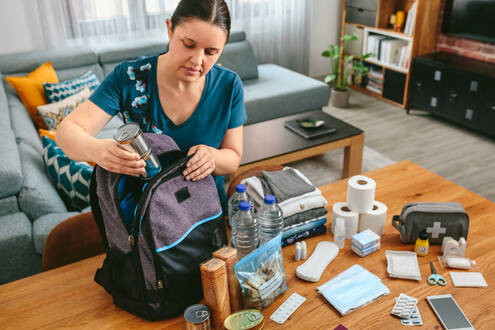
The difference between an emergency and an adventure can often be preparedness. Small actions—such as adding one item to your preparedness kit each month—can increase your preparedness and improve your safety during unexpected events.
Tricia Zahn, MPH, senior director for Population Heath at Cheshire Medical CenterDo you enjoy solving problems? Do you enjoy helping others? Preparedness is a way to do both from the comfort and familiarity of your own home. Being prepared for unexpected events is a great way to solve future problems. If you have what you need to be safe in a power outage, for example, you then have the opportunity to help others.
“The difference between an emergency and an adventure can often be preparedness,” said Tricia Zahn, MPH, senior director for Population Heath at Cheshire Medical Center. “Small actions—such as adding one item to your preparedness kit each month—can increase your preparedness and improve your safety during unexpected events.”
Start your preparedness kit today
Creating a preparedness kit is an example of an action everyone can take today to improve their ability to shelter in place (remain in your home if needed during an emergency). For example, if your driveway is washed out, do you have what you need for a couple of days? Do you have enough water for everyone in your household for at least three days? One gallon per person per day is the recommended amount, and don’t forget about pets too. Do you have flashlights and batteries ready in case of a power outage?
For rural communities with occasional disastrous weather, having and/or reviewing your emergency kit can be a literal life-saver. Make a commitment this month to start or refresh your preparedness kit — then follow each month by adding one item.
Remember, you don’t need to check every box on this list or spend a fortune to be prepared! Most emergency kits are filled with extra items you already have in your home.
Emergency plan
- Important documents
- Hand-crank radio
- Phone charger(s)
- Pencil and paper
- Map
- Money
Clothes and blankets
- Warm blankets
- Seasonal clothes
- Socks and footwear
First aid
- Rubber gloves
- Gauze and Band-aids
- N-95 mask
- Thermometer
- Scissors
- Ice packs
Emergency supplies
- Lighter and matches
- Flashlight
- Extra batteries
- Rope
- Duct tape
- Swiss army knife
- Whistle
Prescriptions and toiletries
- All prescription medications
- Three rolls of toilet paper
- Hand sanitizer
- Toiletries
Attend or host a preparedness training
Are you interested in a preparedness training to learn more about ways to help yourself and others prepare for unexpected events? Visit our Community Education webpage to check for future offerings. If you have a group you would like to schedule a training for, please reach out to Kerry Kelley at kkelley@cheshire-med.com to schedule a training at your convenience.
Get involved
Are you interested in learning more about ways to stay connected and help others? Consider joining our regional Greater Monadnock Medical Reserve Corps (GMMRC). The GMMRC is a regional group of volunteers, both medical and non-medical, that train together to be prepared to help others during public health emergencies. Our volunteers also gather to connect and learn new information such as Hands Only CPR and Disaster Animal Response Team skills.
To learn more, or to volunteer with the GMMRC, reach out to Kerry Kelley at kkelley@cheshire-med.com.